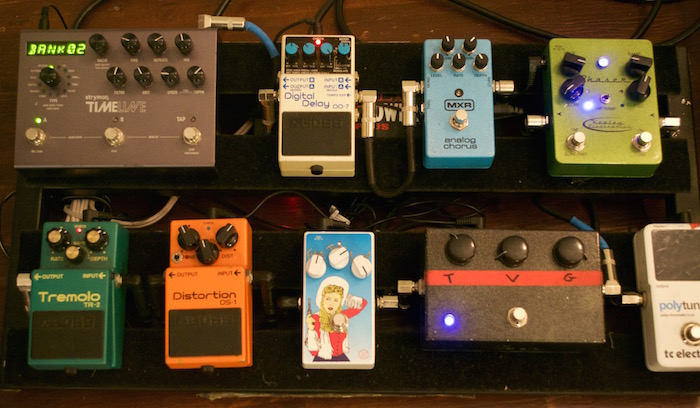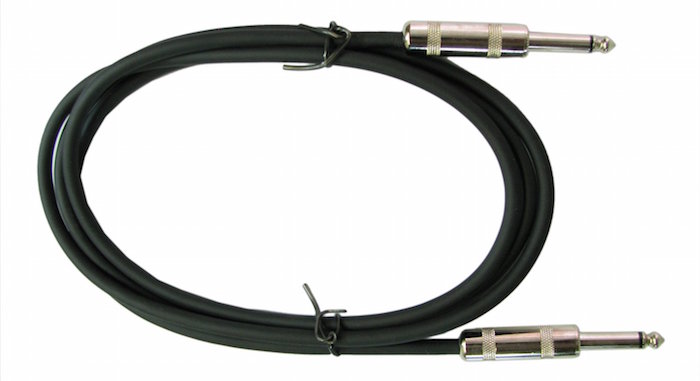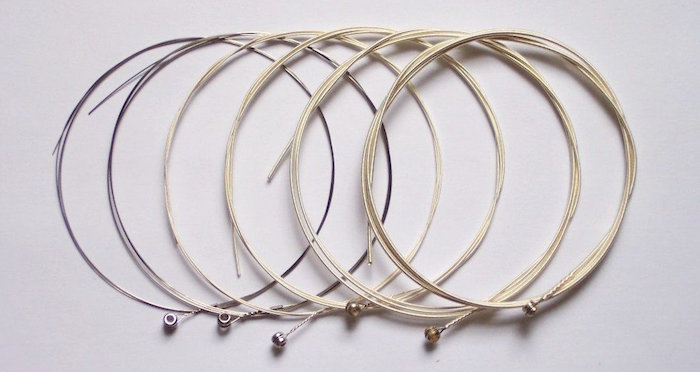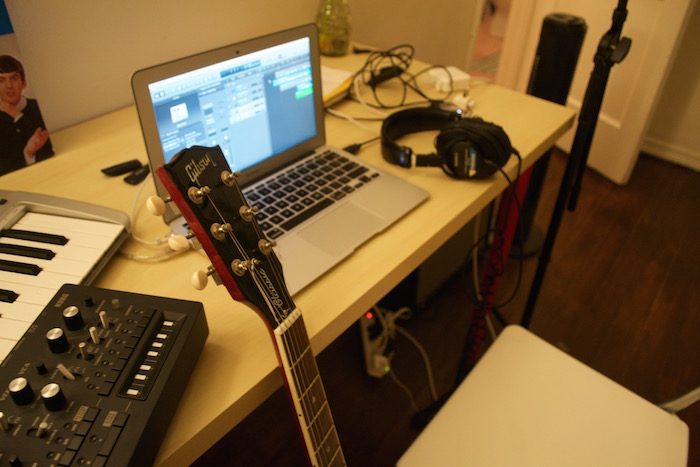This article originally appeared on Soundfly.
If you’ve ever wondered how to cross the line from being a good to a great guitarist, you've probably already identified some key factors to focus on – mastery of technique, the quality of your gear, and learning to adopt different performative styles. But I wouldn’t start with any of those – I would start with organization. I have studied the habits of many great guitarists, and the common thread linking almost every master player together is the level of organization they bring to all aspects of their musical life.
So what does organization mean for a guitarist exactly? Let's break it down into two categories: keeping your gear organized, and keeping your practice organized. For me, it's all about the details. You can't make it big without first mastering the small.
Organizing your gear
 Photo by Carter Lee
Photo by Carter Lee
Pedalboard
You don't want to be the guy stepping into a virtual cesspool of stompboxes, cables, and power adapters. We've all seen him: the guitarist who drags his pedals around in a backpack or a duffel bag, spending half an hour just unwrapping his tangled cables. Not only does this reflect poorly on the guitarist as an individual, it also makes whatever band you're in look less pro. Consider that if your setup time is minimal and easy, you can use that extra time to settle into your space and get your head ready for your gig or jam – truly invaluable.
Your pedals and cables will last longer in proper accommodations, and your tone will be more consistent if you're not tearing everything apart after you play. That's why having a mapped out and consistent pedalboard can help you rise above these annoying problems. There are lots of casing and size options for whatever your needs are, whether you're playing at local blues bar jams, church services, or hauling from city to city in a Sprinter.
[The Guitarist's Guide to Building a Formidable Pedalboard]
Cables and power
 Image via flypaper.soundfly.com
Image via flypaper.soundfly.com
Here we are, down in the basement of one of the least glamorous factions of the guitar department, but one of the most critical. If you have any cables that cut out or are unreliable, throw them out and replace them (or repair them if you're handy with a soldering iron). Try to stick with the same brand for tonal consistency. There are a few coveted brands that really do transcend the rest, like George L's and Mogami, but if you aren't in a position to spend all your hard-earned cash on cables – a position I had been in most of my career – you don't have to break the bank. Even the $2.99 cables from the bucket on the shop counter will do in a pinch. And it's a good idea to keep a few extra in your gig bag in case one bites the dust before, or worse, during a show. In fact, you should always make it a habit to keep a few extra cables with you.
For those pedalboards that don't come with a built-in power source, a power supply brick is a necessary component for a reliable, consistent sound. And be aware, pedals that use a lot of processing power can be noisy if they aren't given an individual power source.
Strings and jacks
 Image via flypaper.soundfly.com
Image via flypaper.soundfly.com
At least once a month, you should slap a new set of strings on your main axe. It's easy and quick, and everyone will notice the improvement in your sound. Old strings carry corrosive dirt and other nasty microorganisms that have no business lurking around in your tone, even if you play sludge metal with Oscar the Grouch. (If you do, get the Cookie Monster to sing lead. I hear that guy can wail.)
A new set of strings, if applied properly, will hold their tuning better than an old ones, and your bandmates will thank you for that. Keep a set of strings and a string winder/clipper in your gig bag, in case of emergency. Speaking of tuning, make sure to have your guitar intonated properly every six months to a year, as opposed to waiting until problems arise. As a helpful aside, keeping a can of DeoxIT around the house is useful to spray into dirty pots or jacks. A lot of the time, if you've got some extraneous noise or fuzz that isn't coming from your pedal chain, a quick spray can solve the problem so you can focus on getting the most out of your sound instead of dealing with the things that shouldn't be in your sound.
Organizing yourself
 Photo by Carter Lee
Photo by Carter Lee
Practicing consistently
Keeping an organized practice schedule is of paramount importance in discovering yourself as a guitarist. Set a schedule, and stick to it. Remember that practicing for consistent periods of time throughout the week will be more effective than marathon sessions every now and again. Your muscles need this type of regularity to learn and adapt, and that is a literal impossibility if you don't give them the proper chance to develop.
Try to keep your focus on whatever it is that you're practicing, instead of glancing at your phone or Facebook every few minutes. Here's a tip I learned from a great songwriter friend: when you practice, are you emotionally invested in every note that you play? Really think about that. It's a challenge, but even just keeping that thought in the back of your head or written on a Post-It note somewhere on your desk will change your playing.
Keep your goals intact
Whether it's the blues scale, the harmonic minor scale, or every scale written in Slonimsky's Thesaurus of Scales and Musical Patterns, the key to guitar mastery is to set goals and stick to them. Guitar playing isn't a race and shouldn't be treated that way! You'll see the strongest results if you stick to a comprehensive curriculum, be it one from a teacher or one you devise yourself. Maybe you've decided to learn a solo you love or test your ear and try to decipher some of the layers in a classic Pink Floyd or Eagles jam? Keeping a practice journal is a great way to organize your goals and keep track of your progress.
Another way I like to practice is to imagine myself auditioning for a particular band – for example, let's say Pink Floyd. What would I want to brush up on for the audition? Well, my scales and note bending, for starters. Also, David Gilmour had a great knowledge of chords, so I might want to go through some of their songs and see what I can learn from his accompaniment.
The more time you spend with your guitar in your hands, working out ideas and wood shedding the tough stuff, the closer you'll get to the sound in your head. Everything else just sets you up so that you can play your heart out and not be bothered by the distractions of an unreliable or unfamiliar rig. Until then, keep your gear in order, learn your parts, and don't forget to look good.
Elyadeen Anbar is a guitarist, writer, and educator residing in Los Angeles, CA. He has had the pleasure of contributing music and production to some of his favorite artists, and graced stages the world over. His work can be found at elyadeenanbar.com, soundcloud.com/mrs-walrus, and selfesteemmusic.tumblr.com.


